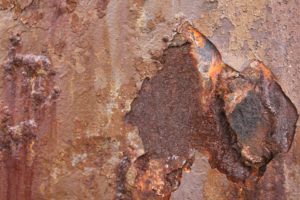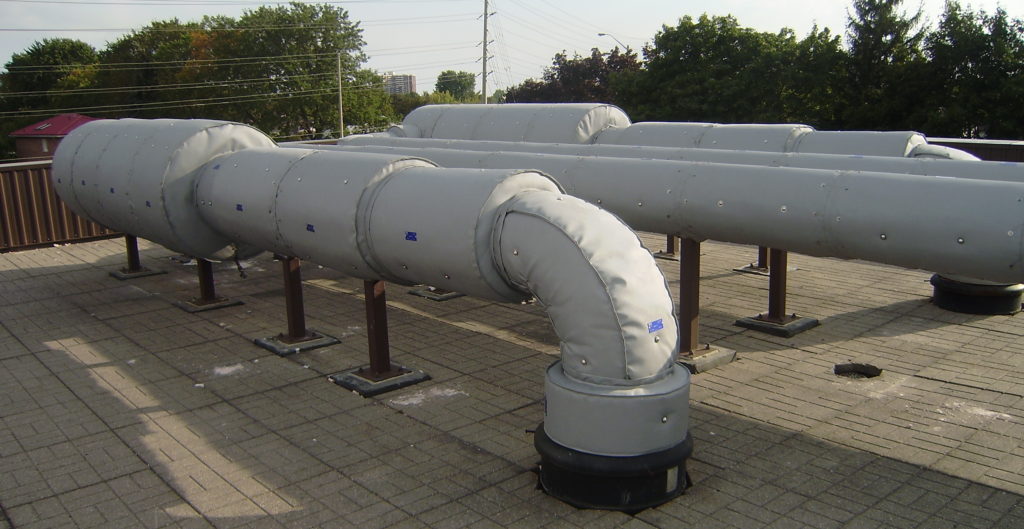We are commonly asked this question: Does insulation cause corrosion? Given the many expenses already involved in plant maintenance, it makes sense to carefully consider factors that might contribute to corrosion—including improperly maintained insulation.
Corrosion under insulation (CUI) is a well-documented problem in processing plants, occurring when moisture builds up underneath the surface of an insulating sleeve. Depending on the piping and insulation material types and the moisture source, substrates underneath insulation maybe vulnerable to multiple corrosion types, such as:
- Galvanic corrosion
- Acidic corrosion
- Alkaline corrosion
- Chloride corrosion
All of these processes have the potential to severely damage pipes or containers, leading to holes and leaks that can shut down segments of a facility—or, in the worst case scenario, the entire facility.
Unfortunately, no combination of metal and insulation is completely immune to CUI, so vigilant maintenance is critical to prevent these outcomes. Still, certain solutions can minimize the risk, including those that can be easily removed and replaced for routine assessment and repair. Firwin’s removable blanket insulation offers one example of a configuration that minimizes CUI risk without sacrificing the efficacy of the system.
The Problem: Causes and Consequences of CUI
 Part of the difficulty in preventing CUI is that it can occur under so many conditions. Factors that may contribute to heightened risk, include:
Part of the difficulty in preventing CUI is that it can occur under so many conditions. Factors that may contribute to heightened risk, include:
- A constant temperature above freezing but below boiling, which is the perfect environment for condensation to form.
- Subpar insulation that contains corrosive compounds or that degrades quickly.
- Insulation placed improperly near sources of water.
The biggest risk factor for CUI, however, is the presence of certain chemicals that react with the metal’s surface to erode its structure. This can take several forms, depending on the specific compounds present. For example:
- Galvanic corrosion is common when the insulation becomes moist in the presence of either an electrolyte or a salt. When this happens, a current can flow between the soaked insulation and the metal surface, inducing serious surface damage.
- The presence of strongly basic or acidic substances can also be problematic. When granular insulations absorb both water and an alkali or acid, the chemicals can remain on the insulated metal’s surface even as the water evaporates, leading to alkaline or acidic corrosion.
- Chloride from industrial processes or natural sources is particularly harmful to stainless steel surfaces, especially when it becomes imbued in a wet insulating sleeve. Chemical corrosion can occur even when the processing equipment itself does not contain harsh chemicals—chloride, for instance, can come from rainwater, a common source of CUI.
While different factors are responsible for each of these categories of CUI, all corrosive damage may be worsened by rigid or permanent insulation. Ideally, technicians should be able to regularly remove insulation to inspect the underlying metal for signs of wear. Failure to do so allows chemical damage to compound until the vessel is irreparable.
Additionally, a permanently insulated fixture might accumulate corrosive damage more quickly as buildup can’t easily be cleaned during routine maintenance. These challenges are especially pronounced in process facilities that routinely handle high quantities of potentially corrosive chemicals, or in piping that experiences routine exposure to the elements.
The Solution to CUI
 The primary solution to CUI is to replace rigid or permanent insulation with a removable solution. In doing so, it becomes much easier to monitor the state of process piping without causing additional damage to the surface.
The primary solution to CUI is to replace rigid or permanent insulation with a removable solution. In doing so, it becomes much easier to monitor the state of process piping without causing additional damage to the surface.
The benefits of this investment are substantial. Removable insulation not only makes routine inspections and maintenance easier, but it also facilitates easier repair. Permanent insulation is difficult to replace without damaging the pipe, but removable covers can easily be taken off of individual segments of machinery or process piping when the exterior begins to breakdown. This advantage can add up to substantial savings over the lifetime of your equipment.
Firwin Insulation Solutions
All of Firwin’s removable insulation covers are engineered for easy access without sacrificing performance. Our covers cling closely to the piping or vessel for a snug fit that repels moisture. Lower quality removable blankets lack this excellent fit, which can sometimes hasten corrosion (rather than preventing it) by allowing additional avenues for moisture to enter.
We produce removable insulation solutions to fit various engine parts and piping systems, including diesel engines that generate enough heat to create a higher risk of CUI. Our solutions not only contain and manage this heat, but do so while mitigating the risk of corrosion.
To learn more about our completely customizable options for insulation and corrosion protection, get in touch with Firwin’s team today.

Comments are closed